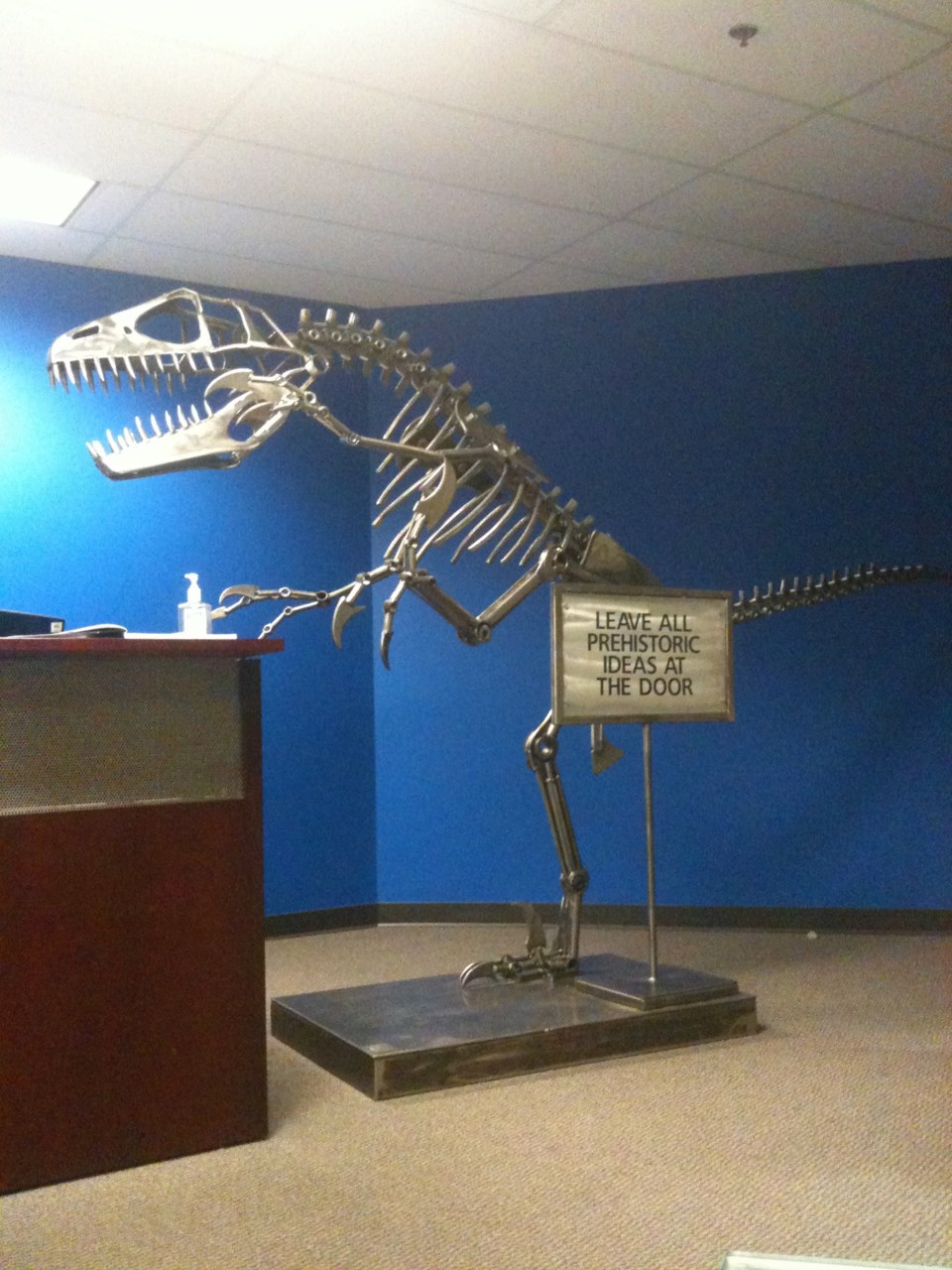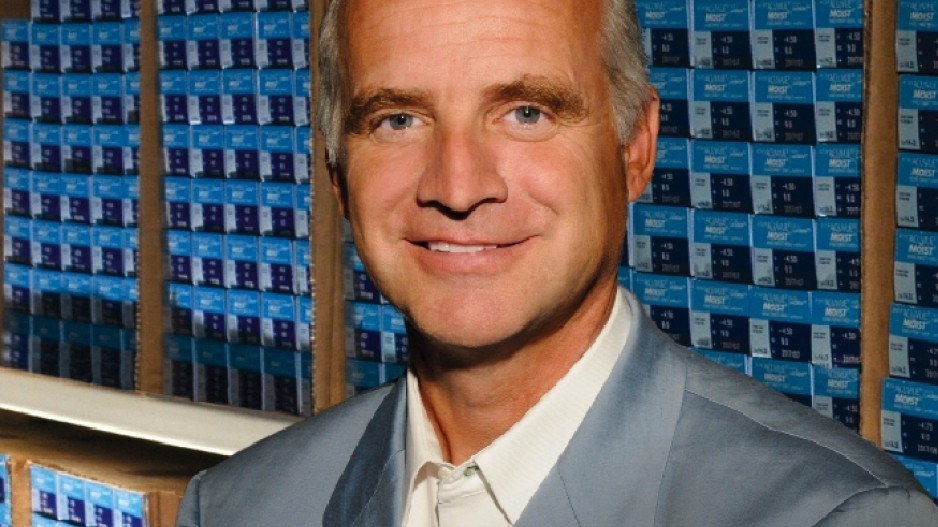When visitors to Coastal Contacts' head office in the Broadway Tech Centre see a 10-foot-high metal Tyrannosaurus rex skeleton next to the reception desk, they are immediately alerted that the online contact lens and eyeglasses seller (TSX:COA) has a disruptive business model.
"Leave all prehistoric ideas at the door" instructs the sign standing next to the extinct beast, whose gaping mouth and pointy teeth are poised to gobble the receptionist.
Company president Gary Collins has no such exotic art on his office's walls.
The former B.C. finance minister has been in his new job for little more than a month, and his office is bare of personal touches, save for a cluster of framed family photos at his desk.
"Those are the important ones," he said, before revealing that the oldest of his three children was having a birthday.
Wanting family time was largely why Collins quit in December 2004 as B.C.'s finance minister after three and a half years in the job.
Like Kevin Falcon, who recently quit as B.C.'s finance minister, Collins had a two-and-a-half-year-old son and a pregnant wife.
Elected in 1991 as one of the 17 BC Liberals who rode leader Gordon Wilson's coattails to victory after the Social Credit party self-destructed mid-campaign, Collins was a flight instructor in the University College of the Fraser Valley's aviation program.
He ran in Fort Langley- Aldergrove – an area that had not elected a Liberal in the previous 75 years.
Nobody else wanted to be the candidate, but Collins didn't like the way the Socreds were running the province, and he had reservations about the NDP.
"I thought I can either shut up or I can do something about it," he said, of his decision to join a party that had attracted a mere 6.7% of the popular vote in the 1986 election.
Wilson's popularity in caucus soon faded, spurring Collins to lead the successful campaign to draft former mayor Gordon Campbell as party leader.

(Image: Tyrannosaurus rex at Clearly Contacts headquarters | Glen Korstrom)
Even though Collins had no formal finance training, Campbell rewarded him with the finance critic portfolio.
Collins' natural aptitude for finance helped him keep the NDP on its toes throughout the Liberals' decade in opposition. It also secured him the finance minister job the day that the Liberals took power in 2001.
"I've considered getting an MBA," Collins said.
"But I've talked to people and felt that given where I am and what I'm doing, there isn't going to be a lot of value because the time commitment would be significant."
Unlike Falcon, Collins quit politics entirely the day he resigned from being finance minister.
The conflict-of-interest commissioner had given him the green light to seek work in the private sector, and Harmony Airways owner David Ho was game to have Collins be president of the four-plane airline.
Ho's focus would later shift to a Shanghai real estate project, and he started to divert capital from the airline to the venture in China.
Collins believed that the airline's survival depended on expanding beyond four planes, so he tendered his resignation in late 2006 – five months before Ho pulled the plug and dissolved Harmony.
Belkorp Group of Companies owner Stuart Belkin hired Collins as a vice-president with responsibilities that spanned several divisions of the diversified conglomerate, which is one of B.C.'s largest family-run ventures.
"One of the things I liked about Belkorp was the diversity of businesses that they were involved in," Collins said.
Unlike his narrower focus as head of a small airline, the role Collins took on at Belkorp reminded him of being in government because of the range of issues that required his attention.
Belkorp invests in everything from energy and waste management to real estate.
"Gary is a talented business executive who made a real contribution to Belkorp during his tenure here," Belkin told Business in Vancouver.
Belkin said he looks forward to continuing to work with Collins through Collins' involvement in some of Belkorp's investments.
Collins serves as a director on the public company boards of Rogers Sugar (TSX:RSI) and Chorus Aviation Inc. (TSX:CHB.b) – companies in which Belkorp has a significant minority stake.
Collins' other board directorship is at Liquor Stores of North America Inc. (TSX:LIQ).
As interesting as the Belkorp job was, however, Collins was itching for a change when Coastal Contacts CEO Roger Hardy asked him earlier this year if he was interested in joining the fast-growing venture.
A year ago, Coastal Contacts had 400 staff. It now has 650 workers, including about 400 based in Canada.
Sales have climbed 80% to more than $184 million in 2011 compared with $102 million in 2007. (See list of 100 fastest-growing companies in B.C. – B15.)
In the process of that expansion, the company has disrupted the traditional eyeglass and contact lens retail business.
Customers seem happy that they can often pay 50% less for products through Coastal's websites – such as Canadian site ClearlyContacts.ca – than at their local optician's store.
But the College of Opticians of B.C. has been less enthusiastic.
Its 2007 BC Supreme Court lawsuit against Coastal Contacts successfully argued that the company was breaking the law by failing to require that customers provide prescriptions and by failing to use eye-care professionals in its dispensing process.
The BC Court of Appeal agreed with the college in a 2009 decision. But in 2010, the B.C. government changed the law to allow Coastal Contacts to continue to sell contacts online without requiring customers to provide a prescription.
"The opticians and optometrists would like the other providers to go away because they do very well selling those products out of their store," Collins said.
But Coastal Contacts' business now reaches far beyond B.C.'s borders.
The company bought Europe's Lensway AB for $18.85 million in 2004 and has a large European business based out of Sweden.
It recently launched a small but fast-growing subsidiary in Brazil.
"The biggest single opportunity for us in the immediate term is the U.S.," Collins said.
"We've got the database of contact lens customers. We've been marketing eyeglasses down there but not in a really assertive way.
"We've predominantly been pushing that in Canada. So, there's really an opportunity to open that up in the U.S. market as well."




